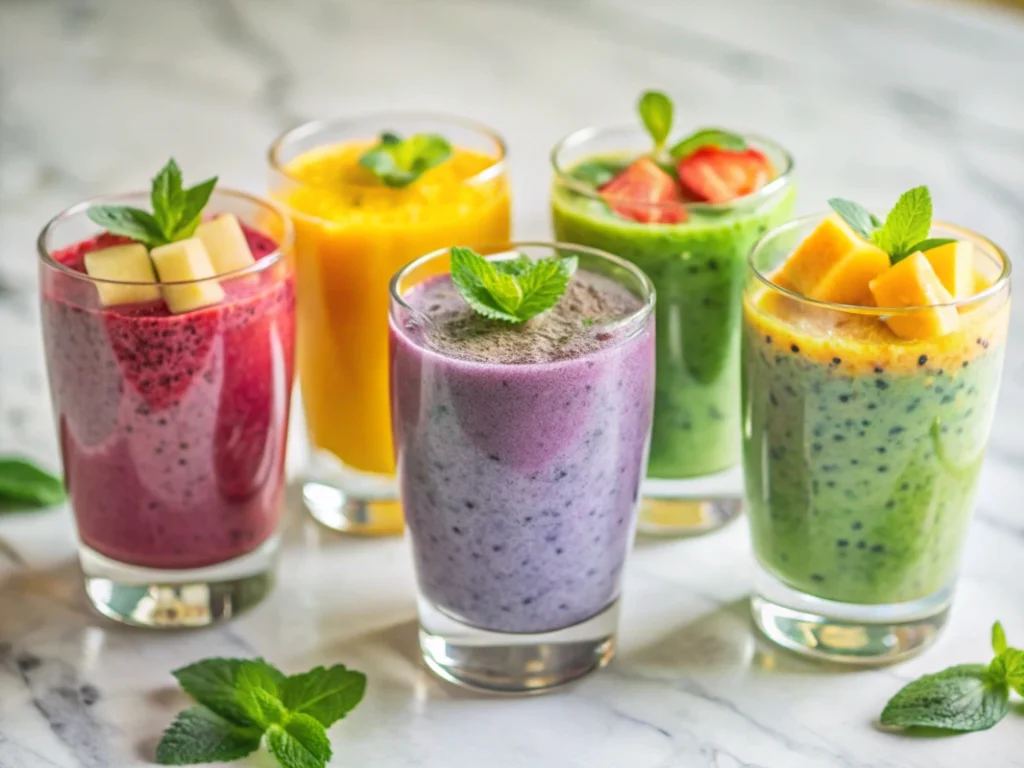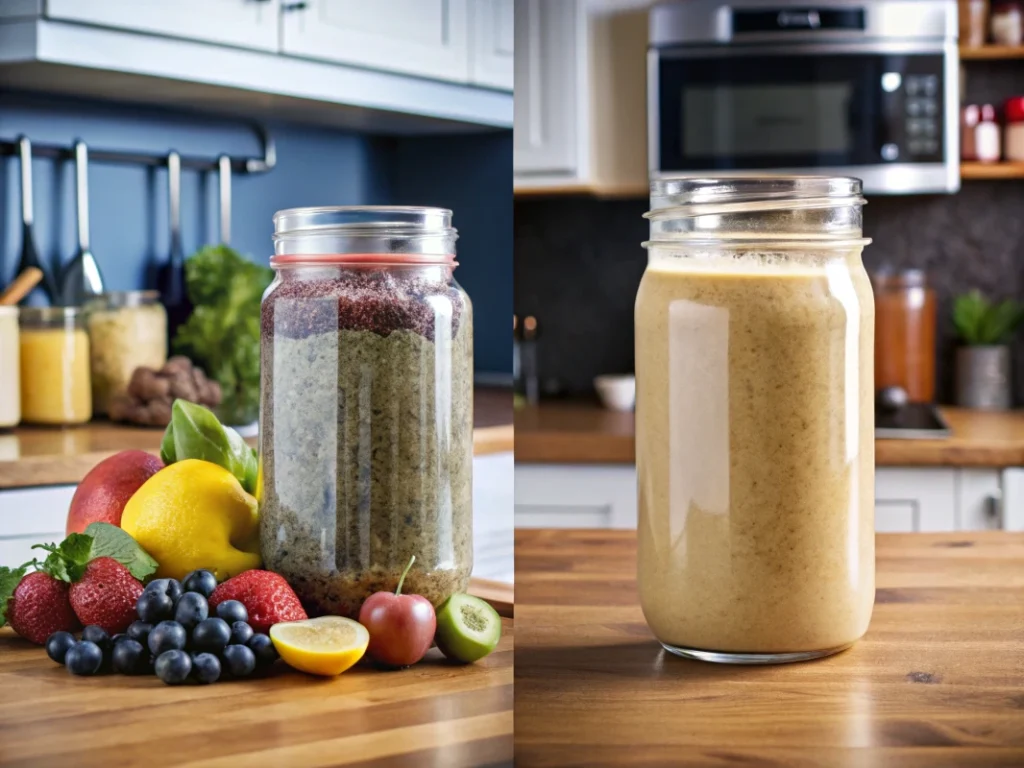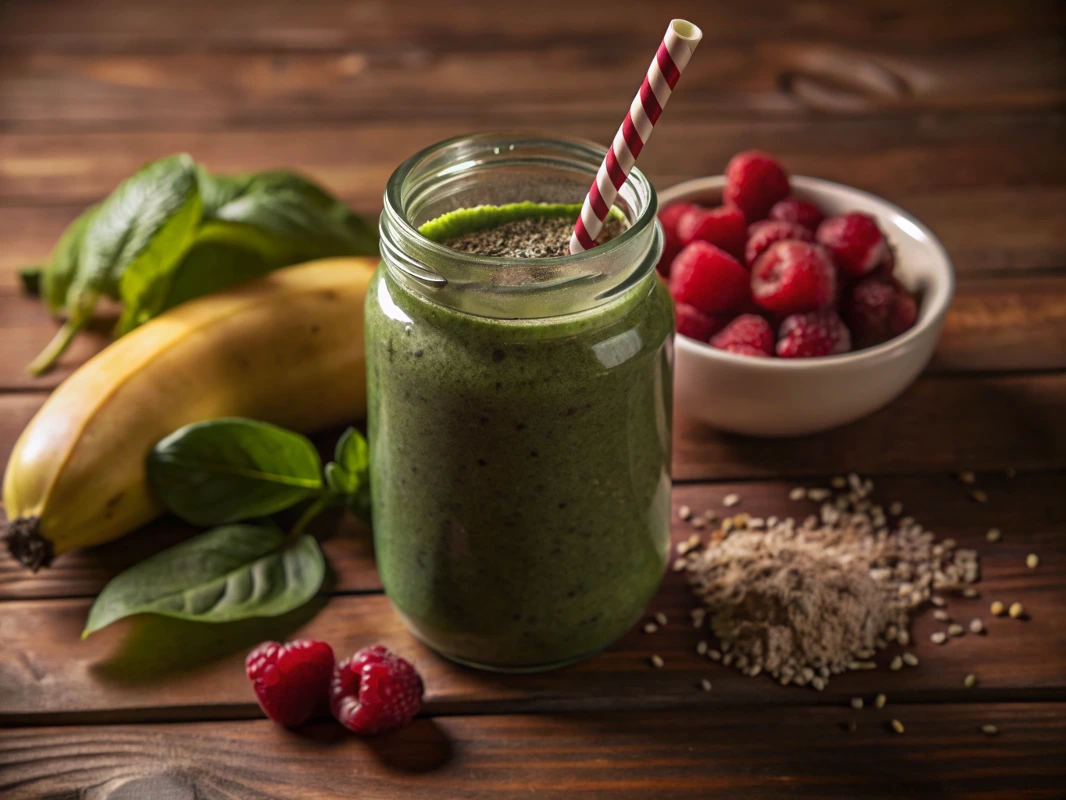The Ultimate Guide to Smoothie Meal Replacements
A smoothie meal replacement is one of the easiest ways to enjoy a quick, nutritious, and satisfying meal without spending hours in the kitchen. Whether you’re looking to lose weight, fuel up after a workout, or simply streamline your nutrition, smoothies offer a versatile and delicious option. But are they really enough to replace a balanced meal? And how do you ensure your smoothie isn’t just a sugary snack in disguise?
In this comprehensive guide, we’ll dive into everything you need to know about smoothie meal replacements. From the nutritional benefits and potential pitfalls to DIY recipes and common myths, we’ve got you covered. Whether you’re aiming to shed a few pounds, boost your energy, or find a convenient meal on busy days, this article will help you master the art of creating the perfect smoothie meal replacement.
Introduction to Smoothie Meal Replacements
What Are Smoothie Meal Replacements?
At its core, a smoothie meal replacement is exactly what it sounds like—a smoothie designed to take the place of a traditional meal. Unlike your typical fruit smoothie, these are carefully crafted to provide a balanced mix of macronutrients (proteins, fats, and carbohydrates) and micronutrients (vitamins and minerals) to keep you full, energized, and satisfied.
Think of it this way: while a regular smoothie might leave you hungry an hour later, a well-made meal replacement smoothie should keep you going for several hours, much like a plate of grilled chicken with veggies and quinoa. The key difference? It’s all blended into one convenient, drinkable form.
Why Are Smoothie Meal Replacements Popular?
There’s no denying it—people are busier than ever. Between work, family, and social commitments, finding time to prepare balanced meals can feel like a chore. Enter smoothie meal replacements. They’re quick to make, easy to customize, and perfect for those looking to lose weight, manage their diet, or simply fuel their day without spending hours in the kitchen.
Plus, with the rise of health-conscious lifestyles, smoothie meal replacements have become a go-to for folks wanting to control their calorie intake, increase their intake of fruits and veggies, or hit their fitness goals without sacrificing convenience. And let’s be honest—who doesn’t love sipping on something that tastes like a dessert but is packed with nutrients?
The Nutritional Value of Smoothie Meal Replacements
Key Nutrients in a Meal Replacement Smoothie
When crafting a smoothie meal replacement, it’s all about balance. To truly replace a meal, your smoothie should be packed with the right mix of macronutrients and micronutrients.
First, let’s talk protein—the star of any good meal replacement smoothie. It keeps you feeling full longer and helps repair muscles. Common protein sources include whey protein, plant-based proteins like pea or hemp, and even Greek yogurt. Then, there’s fiber, which not only aids digestion but also adds bulk to keep hunger at bay. Ingredients like chia seeds, flaxseeds, and leafy greens like spinach are excellent fiber boosters.
Next up are healthy fats. Don’t shy away from fats like avocado, nut butters, and coconut oil. These fats slow digestion, helping you stay fuller for longer. Finally, don’t forget about vitamins and minerals. Fruits like bananas, berries, and mangoes add essential vitamins, while a dash of superfoods like spirulina or maca powder can give your smoothie an extra health kick.
How to Balance Macros in a Smoothie
Balancing macronutrients in your smoothie is crucial if you want it to serve as a true meal replacement. A good rule of thumb? Aim for a balance of 40% carbs, 30% protein, and 30% healthy fats. This ratio keeps your energy levels steady and prevents those dreaded post-smoothie crashes.
For carbs, opt for complex carbs like oats or quinoa instead of loading up on just fruits. Combine this with a high-quality protein source—whether it’s a protein powder or something natural like Greek yogurt. Finish it off with some healthy fats—think almond butter or a splash of flaxseed oil. This combo not only keeps you full but also fuels your body with sustained energy.
Common Mistakes in Smoothie Nutrition
While smoothie meal replacements are a fantastic option, it’s easy to fall into a few nutritional traps. One of the biggest mistakes? Overloading on sugar. Adding too much fruit, honey, or even store-bought juice can turn your healthy smoothie into a sugar bomb, spiking your blood sugar and leaving you hungry soon after.
Another common pitfall is skipping essential nutrients. Some folks forget to include enough protein or fiber, which are key for feeling full. Finally, relying solely on store-bought smoothies can be tricky. Many pre-made options are high in sugar and low in essential nutrients, making them less effective as meal replacements. Always read labels carefully!
Benefits of Using Smoothies as Meal Replacements
Weight Loss and Smoothie Meal Replacements
One of the biggest reasons people turn to smoothie meal replacements is for weight loss—and it’s easy to see why. Smoothies can be a calorie-controlled, nutrient-dense option that helps you manage your intake without feeling deprived. When done right, they provide the right balance of nutrients to keep you full and energized, helping you avoid mindless snacking later in the day.
Studies have shown that using meal replacement shakes or smoothies as part of a calorie-restricted diet can lead to significant weight loss. The trick? Consistency and making sure your smoothie is packed with protein, fiber, and healthy fats. By replacing a high-calorie meal with a well-balanced smoothie, you can reduce your daily calorie intake without sacrificing nutrition.
Convenience and Time-Saving Advantages
Let’s be honest—life gets busy. One of the best things about smoothie meal replacements is how quick and convenient they are. Got five minutes? That’s all you need to whip up a nutritious meal that you can take on the go. No pots, no pans, and definitely no dishes piling up in the sink.
For those juggling work, family, and social commitments, smoothies offer a hassle-free solution to staying healthy. Whether you’re dashing out the door in the morning or need a quick lunch between meetings, a smoothie can be your go-to meal that saves both time and effort.
Boosting Energy and Focus
Ever feel sluggish after a heavy meal? That’s where smoothie meal replacements shine. Because they’re loaded with nutrient-dense ingredients and free from heavy, processed foods, they provide a clean energy boost that keeps you alert and focused throughout the day.
Ingredients like spinach, berries, and chia seeds are rich in antioxidants and omega-3 fatty acids, which help improve mental clarity and reduce fatigue. Plus, the steady release of energy from balanced macros means you won’t experience those dreaded afternoon crashes.
Are Smoothies a Good Meal Replacement?
When Smoothies Can Replace Meals
So, can smoothies really take the place of a full meal? Absolutely—but it depends on how you make them. A smoothie meal replacement is only effective when it’s packed with the right balance of protein, healthy fats, and fiber. These nutrients work together to keep you full and provide sustained energy throughout the day.
For instance, if you’re rushing out the door in the morning or need a quick lunch between meetings, a nutrient-dense smoothie can be a lifesaver. They’re especially handy for people following weight loss plans, busy professionals, or anyone who struggles with preparing full meals. Just remember, tossing a banana and some yogurt into a blender won’t cut it. You need to ensure your smoothie includes a variety of whole foods to make it a true meal replacement.
Limitations and Considerations
However, it’s not all smooth sailing. While smoothie meal replacements are convenient, they’re not always suitable for everyone. For one, drinking your meals can lead to lower satiety compared to eating solid foods. Some people might find themselves hungry again sooner than expected.
Additionally, relying too heavily on smoothies might cause you to miss out on the textural variety that whole foods provide, which can affect your overall satisfaction with meals. Plus, not all smoothies are created equal. Many store-bought options are loaded with sugars and lack the protein or fiber needed for a balanced meal. So, if you’re replacing meals regularly, it’s best to make them at home where you control what goes in.
How to Make the Perfect Smoothie Meal Replacement
Essential Ingredients for a Balanced Smoothie
Creating the perfect smoothie meal replacement is all about balance. Here’s a simple formula to follow:
- Protein: This is key for keeping you full and supporting muscle health. Add protein powder, Greek yogurt, or tofu.
- Healthy Fats: Fats slow digestion and help keep you satisfied. Think avocados, chia seeds, flaxseeds, or a spoonful of nut butter.
- Fiber: Helps with digestion and fullness. Toss in leafy greens, berries, or oats.
- Complex Carbs: Provide sustained energy. Add bananas, sweet potatoes, or quinoa.
- Liquid Base: Use almond milk, coconut water, or just plain water to blend it all together.
Don’t forget to throw in some superfoods like spirulina, maca powder, or cacao nibs for an extra nutrient punch.
Customizing Smoothies for Your Goals
One of the best parts about smoothies? They’re super easy to customize based on your health goals.
- For Weight Loss: Focus on high protein and fiber while keeping sugar low. Swap out high-sugar fruits like mangoes for berries and add ingredients like spinach or chia seeds.
- For Muscle Gain: Amp up the protein. Add extra scoops of protein powder, Greek yogurt, and even oats for those complex carbs that fuel muscle growth.
- For Overall Health: Balance is key. Include a variety of fruits, veggies, and healthy fats to keep your body fueled and satisfied throughout the day.
Top 5 Smoothie Meal Replacement Recipes

Ready to get blending? Here are five easy, delicious, and nutrient-packed smoothie recipes to get you started:
- Green Power Smoothie
- Spinach, banana, avocado, chia seeds, protein powder, and almond milk.
- Berry Protein Blast
- Mixed berries, Greek yogurt, oats, flaxseed, and coconut water.
- Chocolate Peanut Butter Delight
- Cacao powder, peanut butter, banana, protein powder, and almond milk.
- Tropical Energy Boost
- Mango, pineapple, coconut milk, chia seeds, and a scoop of protein powder.
- Post-Workout Recovery Smoothie
- Tofu, banana, blueberries, oats, spinach, and water.
Store-Bought vs. Homemade Smoothie Meal Replacements

Pros and Cons of Store-Bought Smoothies
Store-bought smoothie meal replacements can be a real lifesaver when you’re short on time. They’re convenient, ready-to-drink, and often marketed as healthy options. Plus, you can find them just about anywhere—from grocery stores to your local coffee shop. But are they really as good as they seem?
On the plus side, store-bought smoothies save time and effort. You don’t have to worry about buying ingredients or cleaning up afterward. Many brands even offer nutrient-dense options packed with protein, fiber, and vitamins. However, there’s a catch. A lot of these pre-made smoothies come with added sugars, preservatives, and artificial flavors. Even the ones labeled as “natural” or “organic” might not have the balance of macronutrients you need for a true meal replacement.
Another downside? They can get pricey. While grabbing a smoothie on the go might seem convenient, buying them regularly can add up quickly. And let’s not forget—when you’re not making it yourself, you lose control over what exactly goes into your drink.
Benefits of Making Your Own Smoothies
On the flip side, making your own smoothie meal replacements gives you full control over the ingredients. You get to choose fresh, whole foods and avoid unnecessary sugars or preservatives. Plus, you can tailor your smoothie to meet your specific health goals—whether it’s weight loss, muscle gain, or just a nutrient boost.
Homemade smoothies are also cost-effective. Buying ingredients in bulk means you can make multiple smoothies for the price of one store-bought drink. And while it may take a bit of time to prep, the payoff is worth it. You’ll know exactly what you’re putting into your body, and you can get creative with flavors and textures.
In the end, while store-bought smoothies offer convenience, homemade options give you the flexibility to create a truly balanced smoothie meal replacement that fits your needs.
Common Myths About Smoothie Meal Replacements
Myth: All Smoothies Are Healthy
One of the biggest misconceptions out there is that all smoothies are inherently healthy. Spoiler alert—they’re not! Just because it’s called a smoothie doesn’t mean it’s good for you. Many store-bought or even homemade smoothies are packed with sugary fruits, juices, and sweeteners that can spike your blood sugar and leave you hungry soon after.
For a smoothie to be a proper meal replacement, it needs to have a balance of protein, fiber, and healthy fats. Simply blending up some fruit and yogurt might taste great, but it won’t keep you full or provide the nutrients your body needs. So, if you’re relying on smoothies as meals, make sure they’re more than just a sugar rush in disguise.
Myth: Smoothies Can Replace Every Meal
Another common myth is that you can replace every meal with a smoothie and still get all the nutrients your body needs. While smoothie meal replacements are a great option for busy mornings or post-workout recovery, they shouldn’t become your go-to for every meal.
Your body thrives on variety—different textures, nutrients, and even the act of chewing all play a role in digestion and satiety. Over-relying on smoothies might cause you to miss out on important micronutrients that come from whole foods like grains, legumes, and lean meats. Plus, drinking all your meals can get boring fast, leading to cravings and, eventually, overeating.
In short, smoothies are a fantastic addition to a balanced diet, but they shouldn’t replace every meal. Use them wisely and enjoy the best of both worlds!
FAQs About Smoothie Meal Replacements
Are smoothies a good meal replacement?
Yes, smoothies can be a great meal replacement—if they’re made with the right ingredients. A true smoothie meal replacement should include a balanced mix of protein, fiber, healthy fats, and complex carbs to keep you full and energized. Without this balance, you might find yourself feeling hungry soon after drinking it.
However, not all smoothies are created equal. Store-bought versions often have added sugars and lack essential nutrients. So, if you’re considering smoothies as a regular meal replacement, it’s best to make them at home. This way, you can control the ingredients and tailor the smoothie to meet your nutritional needs.
Can you have smoothies instead of meals?
Absolutely! You can replace meals with smoothies, especially when you’re short on time or need something quick and nutritious. A smoothie meal replacement is perfect for breakfast, lunch, or even a post-workout meal, as long as it contains enough calories and nutrients to substitute a full meal.
That said, it’s important not to replace every meal with a smoothie. Your body needs a variety of textures and nutrients from whole foods to stay healthy. Using smoothies to replace one or two meals a day can be effective, but make sure your other meals are well-rounded and include plenty of whole grains, lean proteins, and vegetables.
Can you lose weight by replacing one meal with a smoothie?
Yes, replacing one meal a day with a smoothie meal replacement can help with weight loss. Since smoothies can be calorie-controlled and nutrient-dense, they can reduce your daily calorie intake without leaving you feeling deprived. The key is to focus on ingredients that promote satiety, like protein, fiber, and healthy fats.
However, be cautious with high-sugar ingredients like fruit juices or sweetened yogurts. These can add unnecessary calories and cause blood sugar spikes, which might derail your weight loss efforts. Stick to whole fruits, leafy greens, and lean proteins to make your smoothie both satisfying and effective for weight management.
Can I replace 2 meals a day with smoothies?
You can replace two meals a day with smoothies, but it’s important to do so thoughtfully. A smoothie meal replacement should be nutrient-dense enough to keep you full and energized throughout the day. If you’re replacing both breakfast and lunch, make sure each smoothie has a good mix of protein, fiber, and healthy fats.
That said, relying on smoothies for multiple meals might not be sustainable long-term. Your body benefits from the variety of whole foods, which provide different vitamins, minerals, and textures that smoothies can’t always deliver. If you’re considering replacing two meals a day, consult with a nutritionist to ensure you’re still meeting all your dietary needs.
Conclusion: Should You Use Smoothies as Meal Replacements?
Summing Up the Pros and Cons
Smoothie meal replacements can be a fantastic way to simplify your nutrition, save time, and even support your weight loss or fitness goals. When made with the right balance of protein, fiber, and healthy fats, they provide a quick and convenient way to fuel your body without sacrificing nutrition.
However, it’s important to be mindful of potential downsides. Relying too heavily on smoothies might cause you to miss out on the variety and textures your body needs from whole foods. Plus, not all smoothies—especially store-bought ones—are created equal. Many are loaded with sugars and lack essential nutrients.
Final Tips for Success
If you’re looking to incorporate smoothie meal replacements into your diet, here are a few tips to keep in mind:
- Balance Your Nutrients: Include protein, fiber, healthy fats, and complex carbs in every smoothie.
- Watch the Sugar: Limit high-sugar ingredients like fruit juices and sweetened yogurts.
- Mix It Up: Don’t rely on smoothies for every meal—variety is key to a healthy diet.
- Make It Yourself: Homemade smoothies give you more control over ingredients and nutrients.
In the end, smoothie meal replacements are a great tool to have in your health arsenal. When used wisely, they can help you stay on track with your health goals while keeping things quick and convenient.

